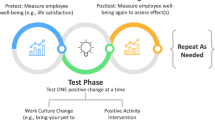
Overview
- Provides a comprehensive, dynamic and multilevel explanation of how workplace wellbeing is created and sustained
- Brings a unique interdisciplinary perspective to understanding organizational practice.
- Opens up new avenues of research for understanding how organizations can protect and promote worker wellbeing
Part of the book series: Aligning Perspectives on Health, Safety and Well-Being (AHSW)
Access this book
Tax calculation will be finalised at checkout
Other ways to access
About this book
In this groundbreaking interdisciplinary work, the authors focus on organizational analysis to understand workplace wellbeing, deviating from previous research that mostly looks at the individual worker or intervention. In addressing the question of why workplace health and wellbeing practices initiatives fall short of delivering sustained improvements in worker wellbeing, this book moves beyond localized explanations of the failure of specific interventions. Instead, it creates theoretical frameworks that explain how wellbeing at work can be improved and sustained. The authors use evidence from systematic and comprehensive surveys of the literature as well as new empirical research, and present an explanatory framework of the processes through which organizations change to implement and accommodate workplace health and wellbeing practices. Learning, adaptation and continuation explain successful implementation of workplace health and wellbeing practices, while Gestalting, fracturing and grafting explain how organizations resolve or negotiate conflict between health and wellbeing practices and existing organizational procedures, systems and practices. In addition, the authors reflect on the implications for research of reframing the unit of analysis as the organization and how studies on workplace wellbeing practices can provide a conceptual platform for thinking about the way organizations can create social value in a broader sense.
This book, authored by experts in their field, is a great resource for academics and professionals of organizational studies and of worker wellbeing across the social sciences, behavioural sciences, business and management courses, wellbeing research, and labour studies.
Similar content being viewed by others
Keywords
- Workplace wellbeing
- Worker health and wellbeing
- Occupational health practice
- Workplace health management
- Organizing wellbeing
- Organizational wellbeing interventions
- Corporate wellness programs
- Implementing workplace health and wellbeing practices
- Occupational health and safety systems
- Evaluation methods
Table of contents (9 chapters)
-
Front Matter
-
Back Matter
Authors and Affiliations
About the authors
Olga Tregaskis is Professor of International Human Resource Management at the University of East Anglia, Head of Norwich Business School and one of the senior social scientists working with the UK’s national What Works Centre for Wellbeing and Centre for Climate Change and Social Transformation. A graduate of both the University of Ulster and Cranfield School of Management, Olga’s research interests centre on human resource management, management in multinational organisations and implementation of change management. She has held an associate editor role at the FT50 ranked academic journal Human Relations, and is editorial board member of a number of prestigious academic journals. She is a member of the REF2021 sub-panel for Business & Management which is the UK’s system for assessing the quality of research in UK higher education institutions. She has published over 100 peer-reviewed journal articles, research reports, book chapters and practice tools.
Rachel Nayani is Associate Professor in Organisational Behaviour and Human Resource Management at the University of East Anglia. Rachel teaches the practices and principles of Organisation Development. Her research primarily involves understanding organisational process and practices for sustainable change and social value including wellbeing alongside enhanced productivity at work and climate goals. Rachel has undertaken research for the UK national What Works Centre for Wellbeing, the Institution of Occupational Safety and Health and the Economic Social Research Council. She has authored several book chapters on wellbeing and remote working, has published in journals such as Work and Stress and is a member of the editorial board of the European Journal of Work and Organizational Psychology.
David Watson is Associate Professor in Organizational Behaviour at Norwich Business School, University of East Anglia. He is an interdisciplinary research who has carried out research on wellbeing in a number of contexts including education, community organizations and the workplace. He is interested in how organizations’ intentions to achieve wellbeing materialise in practice and factors associated with this. Through funded research David has carried out a number of evidence reviews exploring relationships between work, learning and wellbeing and in-depth qualitative fieldwork. He is the author of several book chapters and peer reviewed journal articles in journals, such as the European Journal of Work and Organizational Psychology; Ergonomics; and Organization.
Accessibility Information
Bibliographic Information
Book Title: Achieving Sustainable Workplace Wellbeing
Authors: Kevin Daniels, Olga Tregaskis, Rachel Nayani, David Watson
Series Title: Aligning Perspectives on Health, Safety and Well-Being
DOI: https://doi.org/10.1007/978-3-031-00665-4
Publisher: Springer Cham
eBook Packages: Behavioral Science and Psychology, Behavioral Science and Psychology (R0)
Copyright Information: The Editor(s) and the Author(s), under exclusive license to Springer Nature Switzerland AG 2022
Hardcover ISBN: 978-3-031-00664-7Published: 08 July 2022
Softcover ISBN: 978-3-031-00791-0Published: 09 July 2023
eBook ISBN: 978-3-031-00665-4Published: 07 July 2022
Series ISSN: 2213-0497
Series E-ISSN: 2213-0470
Edition Number: 1
Number of Pages: XII, 164
Number of Illustrations: 2 b/w illustrations
Topics: Employee Health and Wellbeing, Social Sciences, general, Human Resource Management, Occupational Medicine/Industrial Medicine, Industrial and Organizational Psychology


